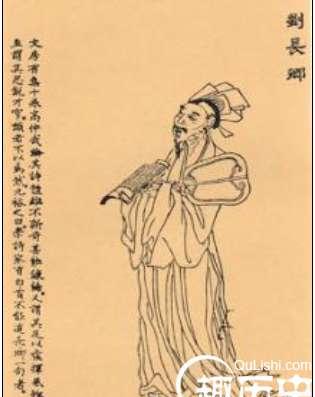Liu Changqing was a Chinese poet of the Tang Dynasty. Xuanzong Tianbao Jinshi. Emperor Suzong oversaw Yushi (御史) as a lieutenant of Changzhou County, and the official was eventually assassinated by Suizhou (隨州), known as Liu Suizhou (劉隨州). Work in poetry, longer than five words, self-proclaimed "Five Words Great Wall".
2 Biographies
Liu Changqing (劉長卿), also known as Liu Suizhou (劉隨州), was also known as Liu Suizhou (劉隨州). A native of Xuancheng (present-day Anhui), Wanghejian (present-day Hebei). His ancestral home was Xuancheng, and he later moved to Luoyang. Yao He's "Extreme XuanJi" rolled down Yun Liu Changqing as a "Xuancheng person"; Volume 5 of Tang Linbao's "Yuan He Surname Compilation" describes the surname Liu Yun of zhu county: "Liu Qingyue, a native of Xuanzhou; Sun Changqing, Suizhou Assassin History. Lin Bao was a little earlier than Yao He, and what he remembered was consistent, which was enough to dispel people's doubts. Song Chen Zhensun's "Zhizhai Book Record Solution", volume 19 poetry collection "Liu Suizhou Collection" ten volumes, and yun: "Tang Suizhou Assassination History Xuancheng Liu Changqing Wenfang written", when lin and Yao Er

Liu Changqing inscribed the saying of the clan. However, the New Book of Tang Yiwen zhi yun refers to Liu Changqing as a person from Hejian (present-day Hejian, Hebei), and the biography of Tang Caizi attacks the clouds: "Hejian people", and the same volume li Jilan article: "Knowing that Liu Changqing in hejian has a yin and heavy disease". Hejian probably refers to its county. When the Changqing clan moved to Luoyang is unknown. And looking at Liu Ji, he knows that Luoyang's old karma is haunting in the middle, and his feelings are very deep, and he is not comparable to those who live in a shallow and short life. Liu Changqing's "Old Book of Tang" and "New Book of Tang" have no biographies, and there has been no confirmed examination of his birth and death years. Wen Yiduo believes that his birth year is 709 AD, Fu Xuanchun believes that it is about 710 or 725, and other theories. The year of death, generally believed to be between 789 and 791; That is to say, Liu Changqing experienced the four dynasties of Xuanzong, Suzong, Daizong, and Dezong.
Liu Changqing studied at Mount Song in his youth, and ascended to the throne between 742 and 746 (Emperor Xuanzong of Tang). In 755 (the fourteenth year of Emperor Xuanzong's reign), Liu Changqing may have only ascended to the throne, but before the list could be revealed, the Anshi Rebellion broke out.
In 756, Emperor Suzong of Tang ascended the throne, and Liu Changqing was appointed as a county lieutenant in Changzhou County, a subordinate to Suzhou. He was soon falsely imprisoned and released in amnesty.
In the first month of 758 (the third year of Emperor Suzong of Tang's reign), he took (acting) Haiyan Ling.
In the spring of 760 (the first year of the first year of the first century), he was demoted to the post of lieutenant of Nanba (南巴, in modern Dianbai, Guangdong), but Liu Changqing did not actually serve in Nanba.
In the autumn of 761 (the second year of the first century), he was ordered to return to Suzhou to receive "re-promotion" and lived in Jiangsu and Zhejiang. At this time, Jiangnan had just experienced liu zhan's rebellion, and the area around Wu County, which was originally prosperous and rich, became dilapidated and depressed.
After 770 (the fifth year of the Tang Dynasty Emperor's calendar), he successively served as a transfer envoy judge, and he was left behind by the transfer of Huaixi and Eyue. Because of his strong personality, he offended Wu Zhongru, the observer of Eyue, and was falsely accused of being corrupt, and was again demoted to Sima of Mu Prefecture (present-day Chun'an, Zhejiang). During the Muzhou period, there were extensive contacts with poets living in Zhejiang at that time, such as Huang Furan, Qin Shi, Yan Wei, Zhang Bayuan, etc. all had poetry rewards.
In 781 (the second year of Emperor Dezong's reign), he was appointed as the Assassin of Sui Prefecture (隨州, in modern Sui County, Hubei). It is known as "Liu Suizhou".
Between 784 (the first year of Xingyuan) and 785 (the first year of Zhenyuan), Huaixi Jiedu made Li Xilie cut off the claimed king and fought fiercely with the Tang Dynasty army in the Hubei region, during which time Liu Changqing left Suizhou.
After Liu Changqing left Suizhou, he moved to Jiangzhou and entered the Huainan Festival in his later years. He died around 790 (the sixth year of Tang Zhenyuan).
3 Works at a glance
Liu Changqing's works have a collection, called "Liu Suizhou Collection", "Tang Poetry Review" called 10 volumes, "Tang Poetry Dictionary Revised Edition" called 11 volumes. There are "Four Series" and "Four Preliminary" copies in the world. Nowadays, there are Chu Zhongjun's "Notes on the Chronicle of Liu Changqing's Poems" and Yang Shiming's "Notes on the Chronicles of Liu Changqing's Poems".
In addition, "Quan Tang Poems" collects 5 volumes of Liu Changqing's poems, and 2 supplementary poems of "Quan Tang Poems" and "Quan Tang Poems Continued Collection".